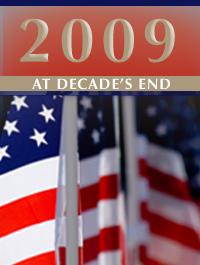
|
America can choose to be self-indulgent to the point of impotence. Alternately, it can opt for the hallmark of maturity – delaying self-gratification in the pursuit of a higher good. It cannot do both.
|
|
| As if to reinforce the pervasive sense of distemper gripping the public of late, the departure of the year 2009 and the decade it concluded were met by most Americans with two words: “good riddance.” Well before the sauntering tones of “Auld Lang Syne” had drifted to the Times Square sidewalks, the public was bidding a remorseless adieu. Amidst all the talk of “the worst decade ever,” it was as if the 1970s had never happened. If only.
The last ten years – the decade now known as “the aughts” – may have been grim, but the pundits are missing its deeper significance. It was the second phase of a new era in American history. A bit of explanation:
Tenure-hungry historians have made a cottage industry in recent years of reworking the calendar to make sense of historical epochs. Thus did the British Marxist Eric Hobsbawm conceive the notion of the “long 19th century,” beginning with the French Revolution in 1789 and ending with the inception of World War I in 1914. Similarly, Hobsbawm cited a “short 20th Century,” beginning with World War I and closing with the fall of the Soviet Union in 1991. Perhaps he is also sympathetic to those who contend that the 21st century began in earnest on September 11, 2001. But that last thesis is more convenient than convincing. For this was not a decade of rebirth. Rather, it was a time of American adolescence.
It bears remembering that when the Berlin Wall came down 20 years ago, the United States had been at war with either the fascists of the Axis Powers or the worldwide communist movement for nearly 50 years. The vast majority of living Americans had spent the greater part of their lives under existential threat from murderous totalitarian ideologies. And even those who could clearly remember the days before Pearl Harbor weren’t exactly basking in halcyon memories. The nation had spent a dozen years prior to the surprise attack mired in an economic catastrophe. With 60 years of such adversities under their belt, they were grounded in a realism born out of repeated trials.
The generation that came of age in the 1990s had no such brutal checks on their optimism. Theirs was a time of peace and prosperity, creating a cult of self-affirmation that conceived of limitless ambition as a birthright and any impediment to self-actualization a sacrilege. Even those who had lived through the previous decades of hardship exhaled deeply, embracing the evergreen tendency to forget the exigencies of a troubled past as quickly as possible (those of you who felt like you hadn’t been at work in years by the second day of your Christmas vacation know this feeling well).
This sanguinity spread to the elites as well. In one of the most highly regarded intellectual treatises of the 1990s, Francis Fukuyama’s “The End of History and the Last Man,” the author posited that humanity had reached its final Hegelian synthesis, with liberal democracy inevitably blossoming as the preferred form of government in every corner of the world.
For those who always thought Fukuyama a bit of a Pollyanna, September 11 was the ultimate validation of their belief that the world had not fundamentally shifted, remaining, in the words of Tennyson, “red in tooth and claw.” By their interpretation, the decade’s cliché of choice (“9/11 changed everything”) had it exactly backwards – 9/11 showed that nothing much had changed. The truth, however, was at the median.
The curse of the aughts was that Americans brought Fukuyama’s hopes to Tennyson’s world – they acknowledged hardship while feeling entitled to be insulated from it. The callow youths of the go-go nineties were transformed into the petulant teenagers of a new millennium.
As a result, terrorism was a threat to be met head on – but only until military casualties mounted too high or European salons grew too obstreperous in their opposition to Guantanamo Bay. The financial crisis was a sobering reminder of the dangers of profligate borrowing and spending – but the federal government needed to lean on lenders to keep the funds from drying up. At all levels of government, the popular cry was to keep taxes low – but not to so much as tap the brakes on government spending.
In many corners, but especially among those who fear American decline, this has been decried as a “lack of will.” It is no such thing. If anything, it is will unbridled – all id and no ego. It is a suspension of reality. But like all suspensions, it must eventually resolve. America can choose to be self-indulgent to the point of impotence. Alternately, it can opt for the hallmark of maturity – delaying self-gratification in the pursuit of a higher good. It cannot do both.
Which path will the nation choose? That is the question to be answered by the new decade. |

























